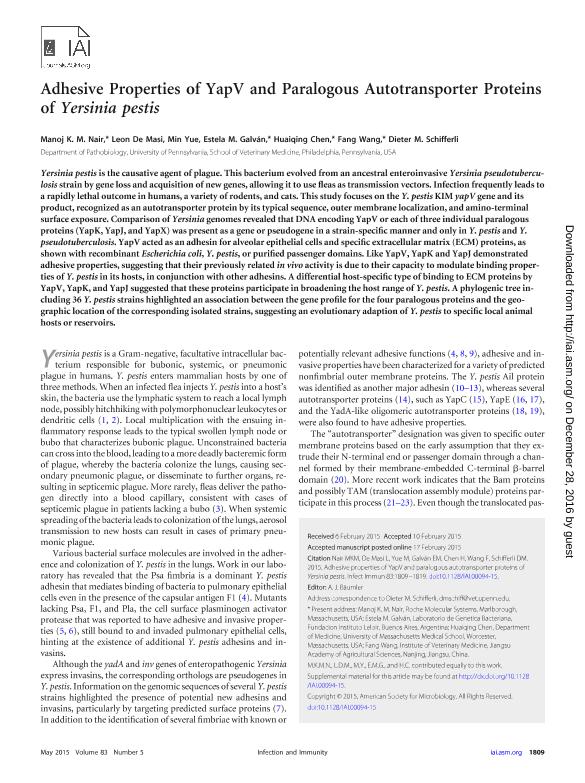Artículo
Adhesive properties of YapV and paralogous autotransporter proteins of Yersinia pestis
Nair, Manoj Kumar Mohan; De Masi, Leon; Yue, Ming; Galvan, Estela Maria ; Chen, Huaiqing; Wang, Fang; Schifferli, Dieter M.
; Chen, Huaiqing; Wang, Fang; Schifferli, Dieter M.
 ; Chen, Huaiqing; Wang, Fang; Schifferli, Dieter M.
; Chen, Huaiqing; Wang, Fang; Schifferli, Dieter M.
Fecha de publicación:
05/2015
Editorial:
American Society For Microbiology
Revista:
Infection And Immunity
ISSN:
0019-9567
Idioma:
Inglés
Tipo de recurso:
Artículo publicado
Clasificación temática:
Resumen
Yersinia pestis is the causative agent of plague. This bacterium evolved from an ancestral enteroinvasive Yersinia pseudotuberculosis strain by gene loss and acquisition of new genes, allowing it to use fleas as transmission vectors. Infection frequently leads to a rapidly lethal outcome in humans, a variety of rodents, and cats. This study focuses on the Y. pestis KIM yapV gene and its product, recognized as an autotransporter protein by its typical sequence, outer membrane localization, and amino-terminal surface exposure. Comparison of Yersinia genomes revealed that DNA encoding YapV or each of three individual paralogous proteins (YapK, YapJ, and YapX) was present as a gene or pseudogene in a strain-specific manner and only in Y. pestis and Y. pseudotuberculosis. YapV acted as an adhesin for alveolar epithelial cells and specific extracellular matrix (ECM) proteins, as shown with recombinant Escherichia coli, Y. pestis, or purified passenger domains. Like YapV, YapK and YapJ demonstrated adhesive properties, suggesting that their previously related in vivo activity is due to their capacity to modulate binding properties of Y. pestis in its hosts, in conjunction with other adhesins. A differential host-specific type of binding to ECM proteins by YapV, YapK, and YapJ suggested that these proteins participate in broadening the host range of Y. pestis. A phylogenic tree including 36 Y. pestis strains highlighted an association between the gene profile for the four paralogous proteins and the geographic location of the corresponding isolated strains, suggesting an evolutionary adaption of Y. pestis to specific local animal hosts or reservoirs.
Palabras clave:
Yersinia Pestis
,
Autotransporter Proteins
,
Adhesion
Archivos asociados
Licencia
Identificadores
Colecciones
Articulos(IIBBA)
Articulos de INST.DE INVEST.BIOQUIMICAS DE BS.AS(I)
Articulos de INST.DE INVEST.BIOQUIMICAS DE BS.AS(I)
Citación
Nair, Manoj Kumar Mohan; De Masi, Leon; Yue, Ming; Galvan, Estela Maria; Chen, Huaiqing; et al.; Adhesive properties of YapV and paralogous autotransporter proteins of Yersinia pestis; American Society For Microbiology; Infection And Immunity; 83; 5; 5-2015; 1809-1819
Compartir
Altmétricas



